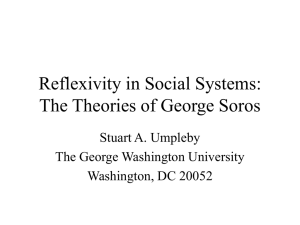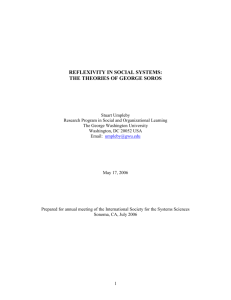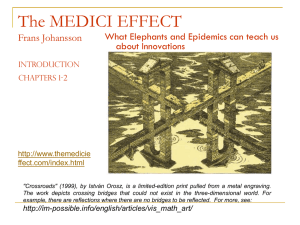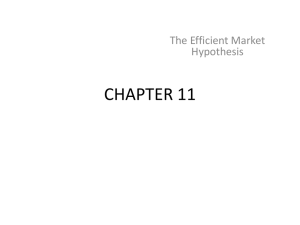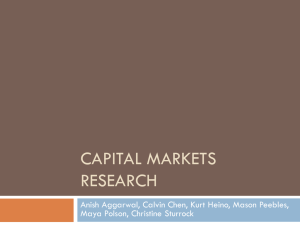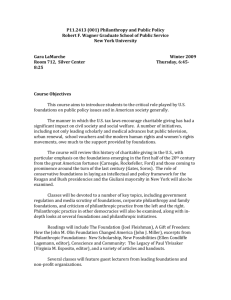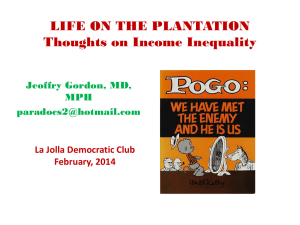George Soros, The Soros Lectures Public Affairs (2010) Herbert
advertisement
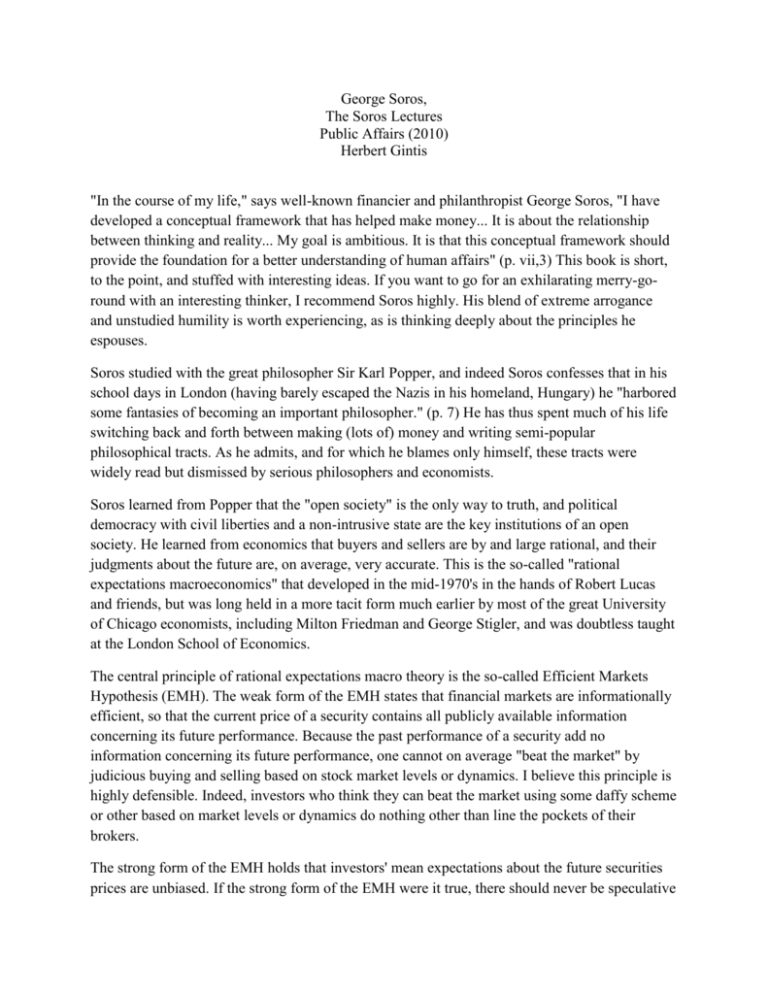
George Soros, The Soros Lectures Public Affairs (2010) Herbert Gintis "In the course of my life," says well-known financier and philanthropist George Soros, "I have developed a conceptual framework that has helped make money... It is about the relationship between thinking and reality... My goal is ambitious. It is that this conceptual framework should provide the foundation for a better understanding of human affairs" (p. vii,3) This book is short, to the point, and stuffed with interesting ideas. If you want to go for an exhilarating merry-goround with an interesting thinker, I recommend Soros highly. His blend of extreme arrogance and unstudied humility is worth experiencing, as is thinking deeply about the principles he espouses. Soros studied with the great philosopher Sir Karl Popper, and indeed Soros confesses that in his school days in London (having barely escaped the Nazis in his homeland, Hungary) he "harbored some fantasies of becoming an important philosopher." (p. 7) He has thus spent much of his life switching back and forth between making (lots of) money and writing semi-popular philosophical tracts. As he admits, and for which he blames only himself, these tracts were widely read but dismissed by serious philosophers and economists. Soros learned from Popper that the "open society" is the only way to truth, and political democracy with civil liberties and a non-intrusive state are the key institutions of an open society. He learned from economics that buyers and sellers are by and large rational, and their judgments about the future are, on average, very accurate. This is the so-called "rational expectations macroeconomics" that developed in the mid-1970's in the hands of Robert Lucas and friends, but was long held in a more tacit form much earlier by most of the great University of Chicago economists, including Milton Friedman and George Stigler, and was doubtless taught at the London School of Economics. The central principle of rational expectations macro theory is the so-called Efficient Markets Hypothesis (EMH). The weak form of the EMH states that financial markets are informationally efficient, so that the current price of a security contains all publicly available information concerning its future performance. Because the past performance of a security add no information concerning its future performance, one cannot on average "beat the market" by judicious buying and selling based on stock market levels or dynamics. I believe this principle is highly defensible. Indeed, investors who think they can beat the market using some daffy scheme or other based on market levels or dynamics do nothing other than line the pockets of their brokers. The strong form of the EMH holds that investors' mean expectations about the future securities prices are unbiased. If the strong form of the EMH were it true, there should never be speculative bubbles, and financial markets should be intrinsically stable. Soros rejects rational expectations theory and the strong form of the EMH precisely because speculative bubbles and financial instability indubitably exist. He is, of course, not alone in holding this position. It may seem that the weak form of the EMH implies the strong, because in the midst of a speculative bubble, those who get out before the collapse necessarily earn superprofits. Therefore the weak form of the EMH appears to imply that there are no speculative bubbles. The problem with the argument is that no one knows when the collapse will occur, and it may always be better to stay in for the ride rather than watch by the wayside. Soros' alternative to rational expectations macroeconomics is the theory of reflexivity. "It so happened that the theory of reflexivity," he tells us, "provided me with a new way of looking at financial markets, a better way that the prevailing theory." (p. 8) The theory of reflexivity starts with the observation that there are two aspects of thinking about the social world: the cognitive (understanding the world) and the participatory/manipulative (changing the world). We thus accept an idea either when it true, or when it is very useful and by accepting the idea, we tend to induce others to accept the idea as well. Thus we may embrace ideas, whether true or false, that when conveyed to others, leads them to behave in ways we prefer. Soros gives the example of the idea `This is a revolutionary moment.' Soros observes, "That statement is reflexive, and its truth value depends on the impact it makes." (p. 13) The most important form of reflexivity for Soros is the reflexive feedback loop: "The participants' views influence the course of events, and the course of events influences the participants' views. " (p. 14) Such feedback loops, suggests Soros, can be negative, in which case the participants' views and the actual situation are brought closer together over time, or positive, in which case they are driven ever further apart. Negative feedback loops are thus self-correcting, while positive feedback loops are inherently self-reinforcing, and hence unstable. Soros also calls positive feedback loops "fertile fallacies." (p. 16) It is obvious how positive feedback loops can explain speculative bubbles, and hence how Soros' theory of reflexivity might provide an alternative to traditional financial theory. Soros goes further than this to argue that the problem with traditional economics is that it pretends that one can do social science in the same way that we do natural science, and that this is a mistake. "In the case of the natural sciences," says Soros, "events unfold irrespective of the views held by the observers." By contrast, in human affairs, the thoughts and ideas of the observers change the social dynamic. As a result, he says, "social theories themselves are reflexive." (p.23) Therefore social science is far different from natural science: the former is more challenging, simply because it is impossible to tease out the cognitive from the participatory/manipulative aspects of a social theory. In particular social theories can suffer from the same sort of positive feedback loops as occur in human thought in general. In the natural sciences, by contrast, there is no participatory/manipulative element to thought, simply because inert matter does not think, and we cannot persuade it to behave the way we would like. Thus there is never a positive value of an incorrect theory over a correct theory. If Soros is correct, then we must abandon any attempt to base economic theory in general, and financial theory in particular, on the sorts of scientific models generally used today, and inspired by the successes of the natural science over the past three centuries. Rather, he argues, a philosophical analysis of economic activity, based on the notion of reflexivity and related ideas, can provide the basis for social policy, much as these ideas, he contends, made money for him. This doctrine should be carefully assessed before lending our agreement, because it implies that economic theory, solidly based on the principles of scientific research, is inevitably the enemy of sound social policy. I shall argue that Soros is incorrect in his relegating social theory to the annals of non-scientific discourse. Soros' assessment of social science is a standard view of some prominent sociologists, especially those informed by Ludwig Wittgenstein's later writing (see for instance Peter Winch's The Idea of a Social Science, 1958). This assessment is rejected by most scientists, natural and social alike. The idea is also a key element of postmodern social theory, which I believe is a humanistic movement lacking any analytical core. Soros does distance himself clearly from postmodernism, asserting that reality eventually comes to bear even on the most vigorous positive feedback systems, holding that a positive feedback system "cannot go on forever because eventually the participants' views would become so far removed from objective reality that the participants would have to recognize them as unrealistic." (16) I infer from this that Soros takes positive feedback systems as occasionally large excursions from a basic equilibrium system in which the majority of feedback mechanisms are negative. Soros defends his assertion that social theory cannot be scientific by stressing that science is about the natural world, but human thought and subjectivity, the core elements of social life, lie in a subjective realm beyond the natural world. Soros' subjective/objective, ideal/material dichotomy has a venerable lineage back to Hegel and Marx, but it is not at all persuasive. The fact is that the human brain is a part of natural reality, and is subject to the same natural laws as the rest of natural reality. Subjectivity is an expression of the genetic structure of Homo sapiens, and despite its complexity, is substantive part of the natural order. For instance, Soros' positive and negative feedback loops, which he is correct in implicating in humans social dynamics, are part of reality itself, and hence in principle can be studied by traditional scientific methods. Moreover, the contention that in the natural world, events unfold irrespective of the views of the observers, whereas in the social world, observers and their theories change the course of events, is not correct. Astronomy, geology, epidemiology, evolutionary biology, and host of other natural science research areas have had huge influence on the direction and pace of social change in the modern world, and natural science theories are regularly espoused and rejected because of their social implications. Indeed, individuals have consistently attempted to interpret scientific principles in a way favorable to their political goals (think of Lysenko in the Soviet Union and George W. Bush and his cronies in the United States). However I do not believe that the social sciences have been substantively affected by the reflexivity of thinking. Soros' second essay is an application of reflexivity theory to financial dynamics. His main point is that the theory of reflexivity is a better approach to understanding the financial system (and making money) than is standard economic theory. I must warn the reader that what Soros calls "economic theory" is almost exclusively neoclassical financial theory, which is not even taught to students in most universities. Young economists are taught that there is a `real' economy on the one hand and `money' on the other hand, and the money side of the economy does not have much effect on the `real' economy. This perspective is probably grossly incorrect, and we can expect economic theory to incorporate finance more directly in coming years. Nevertheless, there is nothing in microeconomic theory, including in the Walrasian general equilibrium model, that suggests that "markets are self-correcting." Free market ideologists may believe this (recall Federal Reserve chief Alan Greenspan's famous admission to the House Committee on Oversight and Government Reform that "Those of us who have looked to the self-interest of lending institutions to protect shareholders' equity, myself included, are in a state of shocked disbelief). He and his colleagues may have believed the strong EMH, but it does not follow from standard economic theory, which indeed has no acceptable model of multi-market dynamics (see my paper Herbert Gintis, "The Dynamics of General Equilibrium", Economic Journal 117 (2007):1289-1309, and related papers on my web site). Soros' critique of standard financial theory, especially the strong EMH, is quite correct. However, it can be couched in terms of standard complex systems theory, especially using models with many heterogeneous agents. Indeed, a vigorously developing school of economic complexity researchers is contesting the strong EMH and related strands of neoclassical financial economics, precisely on the grounds that there are strong interactions among agents in the financial sector that can lead to positive feedback loops. Thus, as Soros suggests, ideas and expectations can be "contagious" so that the error terms in modeling financial forecasts are positively correlated, leading to economic series with "fat tails" as compared with standard Gaussian distributions. This means that excursions from equilibrium are highly likely under some conditions. I should stress these alternative models are completely scientific, and do not employ any conceptual notions that are absent from standard scientific theories. Soros also criticizes so-called "rational expectations" macroeconomic theory, as developed by Robert Lucas, Robert Barro, Thomas Sargent and others identified with the University of Chicago economics department. Soros' critique is perfectly correct. This theory fails to deal with financial fragility because it was not created to deal with the financial sector at all. Rather, it was created as a reaction to the Keynesian theory that increasing the money supply and increasing aggregate demand through running government deficits could not trigger inflation until unemployment was purely frictional (perhaps three or four percent). The stagflation of the mid1970's showed that this theory was incorrect, and the rational expectations school explained this failure by noting that economic actors could not be fooled into ignoring the possibility of inflationary spirals and the necessity of repaying government debt through higher taxes in the future. I believe rational expectations macroeconomics is fundamentally flawed and must be replaced, but the rational expectations school was a scientific rather than purely political intervention, despite its huge implications for economic policy. The true weakness of rational expectations theory is revealed only when we try to use it to understand financial fragility and other aspects of international economics based on the interaction of heterogeneous agents operating in complex networks. In this context, the theory is about as flawed as Soros suggests, and for reasons that he lays out clearly in his second essay. The policy recommendations that flow from both the reflexivity approach and heterogeneous agent complexity theory agree on the following policy recommendations for reforming the world financial system. These recommendations all stem from the simple observation that contemporary financial fragility is caused by excessively tight interactions among participants in the network of financial institutions. This excessive institutional interpenetration leads to amplifying rather than damping reactions to shocks to the system. 1. Banking regulations should foster a large number of small and medium sized financial institutions, as well as limited inter-institutional connectedness. 2. There should be firewalls between different types of financial institutions of a sort that limit contagious asset bubbles and collapses. 3. Stockholder groups should ensure that monetary incentives for decision-makers in the financial sector favor long time horizons. 4. There should be a complete separation of auditing and audited institutions. In particular, the latter should not hire and fire the former. 5. Auditing firms should be financially liable for covering up weaknesses in the firms they audit. 6. We need a new macroeconomic model replacing the rational expectations model that is engineered to deal with complex networks of financial institutions. 7. There perhaps should be a small tax on financial transactions. 8. The European Union should develop a central back with the full powers of a national central bank. 9. Government accounts should be audited by international lending institutions, thus preventing covering up the true state of a country's finances. The major impediment to implementing these changes is the political influence of the financial sector, especially in the United States. The current "too big to fail" system is perfectly acceptable to the giants of finance, and the move to accountability will be vigorously opposed. In Europe, the obstacle to reform is political fragmentation. Soros' third lecture is potentially very interesting, but as it stands is not well thought out. Soros uses the same arguments to critique Popper's "open society" theory that he does to critique the current financial system (positive feedback loops), but instead of concluding that we need more openness to prevent or dampen or eliminate feedback loops in public discourse, he concludes that nothing can be done. This is an excessively hasty rush to judgment. Just as we can reform the financial system, we can foster public institutions that promote truth-telling and negative feedback loops. In his third essay, Soros defines the "Enlightenment fallacy" as the notion that "free political discourse is aimed at understanding reality" (p. 55). This of course was the major premise of his teacher Karl Popper, but Soros believes that the "manipulative function" of thinking undermines the "cognitive function," so that the open society need not produce truth. This is of course correct, but is not grounds for rejecting the open society, unless one proposes a superior social alternative. To my knowledge, there is none. Soros does not suggest otherwise, but he remains supremely pessimistic about the possibility of a human social system that consistently produces truthful discourse. "People are not particularly concerned with the pursuit of truth," says Soros. "They have been conditioned by ever more sophisticated techniques of manipulation to the point where they do not mind being deceived; indeed, they seem to positively invite it." (p. 60) I consider this very far from a plausible interpretation of how citizens value truth in open societies. Soros goes to great length to distinguish himself from postmodernism, which is a justly reviled movement of superficial mindlessness that has infected intellectual life in recent decades, but only on one point: Soros holds, in contrast to postmodernism, that eventually reality takes over and destroys the socially constructed fantasies that people have created. He agrees with the postmodernists that human beliefs, even in contemporary post-Enlightenment societies, are socially constructed without regard to the objective facts. Soros' bizarre position concerning the open society is an extension of his assessment of the Efficient Market Hypothesis. Just as investors manipulate their expectations so as to generate financial bubbles and crashes, so voters manipulate their critical faculties to support whatever form of wishful thinking they are collectively taken up by. However, the correct critique of the EMH is not based on inadequacies of human nature (as some famous economists are wont to do, in including Robert Shiller and George Akerlof in their book, Animal Spirits) is not in accord with what we know about financial dynamics. Central to financial dynamics is a tendency towards "herding behavior" because when information is incomplete, it is often optimal to imitate the decisions of others and to adopt, provisionally, their assessment of business conditions. This can occur even when most, or even all, market participants do not believe their behavior can be sustained in the long run. Inadequacies of human nature are not involved in this dynamic at all. The same line of reasoning applies to public discourses in general. There is no superior alternative to free and open discussion in a democratic society, even though there are surely conditions under which this framework can lead to very poor decisions. Supporters of the open society do not passively bemoan the irrationality of public decision-making, but rather work to ensure that the institutional structure of society minimizes the possibility of poor decisions. Every major failure of discursive decision-making of which I am aware was based on the public's being deceived by faulty information. Voters supported the invasion of Iraq believing that Saddam Hussein harbored weapons of mass destruction. When that turned out to be false, voters moved quickly to wanting the US to leave Iraq as soon as decently possible. The financial collapse in the US in 2007 was based on faulty information concerning the quality of residential mortgages, exacerbated by financial auditors who simply lied about the health of the enterprises they audited. The current Euro crisis was caused by the Greek government lying about the size of its debt obligations at the time of its admission to the Euro region. To make the open society decision-making process work, we must make it more open. It's that simple. The fourth of Soros' essays is devoted to what he calls the agency problem. "Agents," Soros says, "are supposed to represent the interest of their principals, but in fact, they tend to put their own interests ahead of the interest of those whom they are supposed to represent." (p.71) Soros recognizes that this is treated at length in standard economic theory (it is a short stretch to say that this is the central message of modern economic theory), but he rightly notes that there cannot be a solution by tinkering with contractual terms with purely monetary incentives, but rather a solution requires that economic actors behave morally, a concept foreign to economic theory. My I and my coauthor Rakesh Khurana, who is a professor at the Harvard Business School, have dealt at some length with this problem: Herbert Gintis and Rakesh Khurana, "Corporate Honesty and Business Education: A Behavioral Model", in Paul J. Zak (Eds.) Moral Markets: The Critical Role of Values in the Economy (Princeton: Princeton University Press, 2008). Rakesh Khurana, From Higher Aims to Hired Hands: The Social Transformation of American Business Education (Princeton: Princeton University Press, 2007); and Rakesh Khurana, Nitin Nohria and Daniel Penrice, "Management as a Profession", in Jay W. Lorch and Leslie Berlowitz and Andy Zelleke (Eds.) Restoring Trust in American Business" Cambridge: The MIT Press, 2005). The essence of our analysis is that there are professions, such as science, law, and medicine, where professional ethics are of such importance as checks on material selfinterest that these professions could not operate on self-regarding motives alone. American business at one time operated on such professional principles, but all that changed when American business schools began teaching agency theory, which holds that greedy self-interest is the motivating principle of business. Khurana argues, correctly I believe, that a healthy business ethic could be fostered even in highly competitive environments.

